‘Star Trek: Discovery’ Actor Talks Diabetes and Insulin Prices
 |
| Illustration by @llnere |
Have you ever imagined playing a being from outer space, flying around the far reaches of the galaxy, all while managing your type 1 diabetes (T1D) under a heavy load of prosthetics and makeup?
Leave it to Noah Averbach-Katz, the New York-based 30-something actor who landed the role of the flaxen-haired, blue-skinned character Ryn on the third season of TV show "Star Trek: Discovery" streaming on CBS All Access. He's been living with T1D since 2003, when he was in eighth grade.
He also happens to be married to fellow Discovery actor Mary Wiseman, who plays red-haired fan-fave character Ensign Tilley. The two met at the prestigious Juilliard School for performing arts.
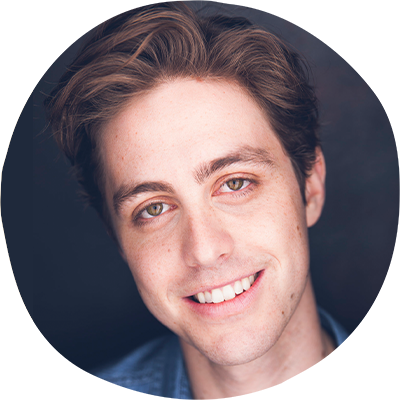
As a self-pronounced Trekkie since childhood, Averbach-Katz says being on the show is a dream come true and a career highlight. Fun fact: He originally auditioned for the legendary character Spock (famously played by the late Leonard Nimoy in the original 1970s "Star Trek" series).
DiabetesMine talked with Averbach-Katz just as Discovery's third season was coming to a close in early 2021, and he shared his love for everything Star Trek along with his own T1D story, how diabetes management helped shape his costume design, and his recent advocacy work with the #insulin4all movement.
DM: How did you first come to love Star Trek?
NAK: I was a "Star Trek" fan well before diabetes, so I was very much one thing as a Trekkie before I was another as someone with diabetes. It was always just a part of my life, thanks to my mom who was certainly a Trekkie going back to the 1970s. She watched the series growing up and for me, we watched "Deep Space Nine" and "Voyager."
I think my own Trekkiness is built on "Enterprise," because that's when I was mostly at the prime TV-watching age. [My mom] would hold these Star Trek parties where my friends and I would all go watch the latest episode, and then she'd make a quiz of that episode and give out themed prizes. It was a lot of fun growing up.
How did your mom react to the news of you landing the role?
At first, she wondered if maybe I had a tiny part in a mask for 30 seconds in the background. I told her I had lines and a specific role to play. She started weeping, and then she ran into a closet and pulled out a model of the Next Generation Enterprise as big as a football, and she started flying it around the house in giddy excitement. And then she cried some more.
How did you first get introduced to Discovery?
As mentioned, I've been a Trekkie for most of my life. Mary and I met at Juilliard and started dating in our third year there, and we'd been dating for 3 or 4 years when she got the show. And I thought, well now we're definitely getting married... [laughs].
I was on set one time with her and was chatting with some of the producers showing them pictures of me at Star Trek conventions when I was younger. Someone at CBS was there and recognized me from a previous role of being on "The Good Fight" show that had aired on CBS All Access. The producer noted that I was a super Star Trek fan who actually had professional acting experience as well.
Weren't you going for the role of Spock?
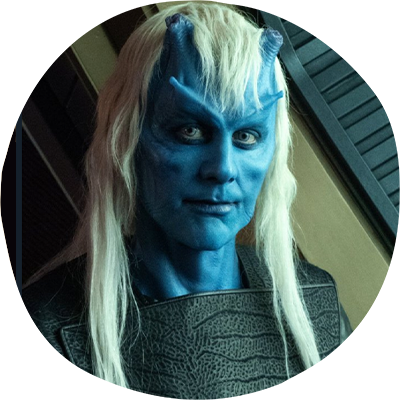
Yes, I actually auditioned for Spock originally, which was awesome. It's funny because the character was code-named "Tom the Andorian" during the read, but I knew pretty quickly that this was a Vulcan not Andorian. They really liked my tape, though the role went to actor Ethan Peck. But they remembered me and a year later, I was with Mary when she was filming in Toronto and auditioned for this part. Then I was on set before I even knew it, as the actual Andorian character named Ryn.
This was all a dream come true, and it's really been special to get to be part of this.
Can you share your first contact with T1D?
I'm the only person in my family diagnosed with type 1 diabetes. Being in eighth grade at the time, I had already been rapidly shedding my baby weight — down 30 pounds to a lanky kid — so my weight loss from the onset of diabetes wasn't readily apparent. There was a long period where things were off, going to the bathroom all the time and being thirsty — the classic T1D symptoms. I was at a family summer camp, and knew something wasn't right so told my mom we needed to go to the doctor. We came back from camp and the family doctor did tests, and he came into the office looking quite sad in telling us I had type 1 diabetes. I didn't know what he was talking about, but his face said "this is bad news," so I knew it wasn't good. That was the summer between eighth grade and my freshman year of high school.
Rather than a family vacation planned to England that summer, we instead went to a diabetes family summer camp — which I was not happy about at all. This was supposed to be my big transition year between middle and high school, hanging out with friends at the movie theater drinking soda... but here I was, at a diabetes summer camp with my parents.
What was your diabetes camp experience like?
I do think diabetes summer camp was useful to my parents, in feeling prepared and talking to other parents. But for me, it solidified the fact that I couldn't be in control of what I was doing in life at that point. I was about to start high school and wanted to take control of my life in sort of every way a 13- or 14-year-old does.
I remember thinking very clearly at the time, that I didn't want to be taken care of more than I need to be. I want to do as much as I can myself. That's continued throughout my life.
What diabetes technology have you used?
I was on a pump for awhile and then switched back to insulin pens, and was doing fingerstick testing before going to a Dexcom G6 CGM during the quarantine in 2020.
Have any Star Trek lessons helped shape your life with T1D?
What I've found is that the [Star Trek] community holds space for so many people with different perspectives or lives, for those who maybe don't belong anywhere else. I've found the response to the type 1 diabetes stuff that I put out there is so positive, not just from people who have diabetes or family with diabetes, but from the whole Star Trek community.
It really does embrace that idea of a "Star Trek Utopia" where healthcare and medicine is free and available for everyone. And also, just because you have some [health condition] doesn't make you less of a person. Or that you can't participate in the creation of the world that you want to be a part of.
Both in life and in Star Trek, I think perspective really allows people to see the world in different ways and allows them to bring different problem-solving abilities to the table.
What made you step up on diabetes advocacy recently?
Diabetes advocacy has always been on my radar, but I haven't really had any platform until recently. My forays into the larger diabetes organizations have been, I would say, less than stellar. Mainly because they're so big, they haven't seemed to need that volunteer, grassroots effort in the same way. As I got older and everyone has gotten more involved in politics, it's become more clear to me personally that with these larger groups taking money from pharma companies, they appear to be de-incentivized to follow what I consider the biggest problems — mainly insulin availability and affordability, particularly in the United States.
Is that how you got involved with the #insulin4all movement?
I'm lucky enough to have insurance and be able to afford my medicine, before and during the pandemic. But earlier in 2020 I came across a friend of a friend who'd lost their job, income, and health insurance because of the pandemic. That person had type 1 and couldn't afford insulin or supplies. I had some leftover supplies and reached out to that person, essentially black market giving them what they needed to stay alive a bit longer. It was worth it, so this guy didn't have to worry about being able to survive this pandemic. I wrote him a note along with that, offering some insulin pricing programs available. But in reading about these programs after the fact, these aren't designed to help people afford insulin; they seem designed to make the companies look good. That's infuriating but unsurprising.
That is a roundabout way of saying I learned more, and got more involved in this issue on social media and seeing what everyone was thinking on this topic of insulin pricing. I landed on T1International and their #insulin4all movement because I felt they are really committed to making a change on a legislative level and they do have a worldwide focus beyond just the U.S. That's important in "Star Trek" because you have many fans in the UK and other places who also can't get their medications but don't necessarily face the same insulin pricing barriers we do here. That's a good reminder to people in the States, that it doesn't have to be the way it is right now.
So I wound up supporting T1International because our interests are aligned, and they don't take pharmaceutical money which is a big deal for me. Because it's a smaller organization and grassroots, the money that I've raised makes a huge difference. I felt like I could make a difference, not only raising some money but also bringing visibility to the organization and this issue.
What has the response been from the Star Trek fanbase?
The response has been amazing. I'm certainly not famous by any means, and I'm in my own tiny little safe corner of the internet. I'm not famous enough to attract trolls, so the response has been great, and there's been very little pushback. People are really showing up, even if they can't give money. They have been retweeting and sharing this, and thousands of people — including my Star Trek friends and castmates — have shared it.
Many of the comments have been "this has happened to me," or to an uncle or parent or someone they know. Seeing that outpouring of support and stories can help people contextualize this and see it's not just happening to a few people somewhere. This really impacts a lot of people, and those on the periphery like friends and family.
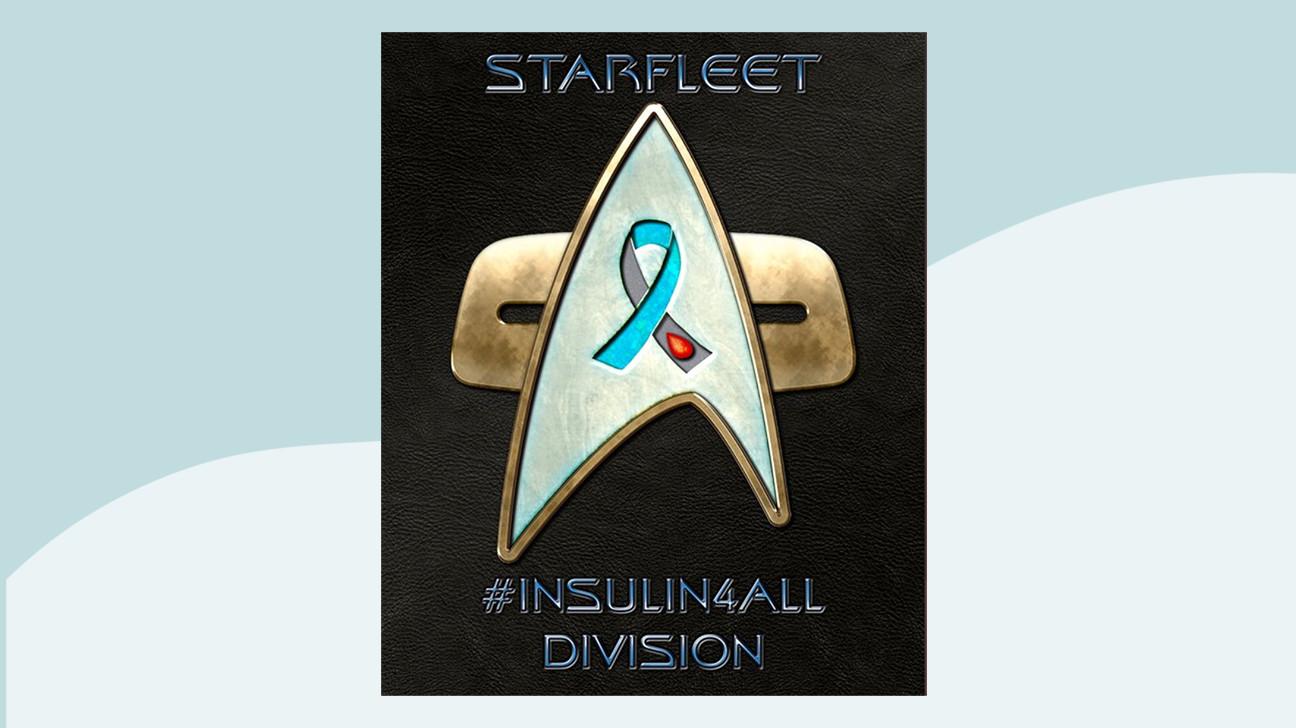
One fan whose podcast I did saw that I'd put #insulin4all in my Twitter bio, and they made this really cool graphic of a Star Trek delta (the symbol that Star Fleet characters wear on their chest) with a blood drop and #insulin4all logo on it. I reached out to T1International about this graphic, and I ended up building an open-ended fundraiser around it. Some fans saw that and made a 3D design and printed some actual physical deltas. I'm hoping to sell, auction, or raffle some of those off to help the cause, maybe with an autograph.
This all happened because of the Star Trek fans, and that's one thing that makes this Star Trek community so awesome.
How did your T1D impact playing the role as Ryn?
This was a very challenging experience diabetes-wise, compared to other roles I've had. At the time, I didn't have a pump or CGM. It was just pens and fingerpricks. That mask I was wearing is so restricting, intense, and massive, so I was very concerned about going high from having that sort of cage around my face.
I didn't want to exacerbate that issue with anything else from a high or low. I was very careful of what I ate and was almost on a zero-carb smoothie diet, and almost didn't eat during the day when I was on set. I was hyper-diligent about it, and so there were no lows or highs that I remember impacting my acting. I spent a lot of time and energy in staying in range, in ways that I wouldn't do in normal life but because this experience was so important to me. I didn't want to feel like diabetes got in the way or impacted my performance.
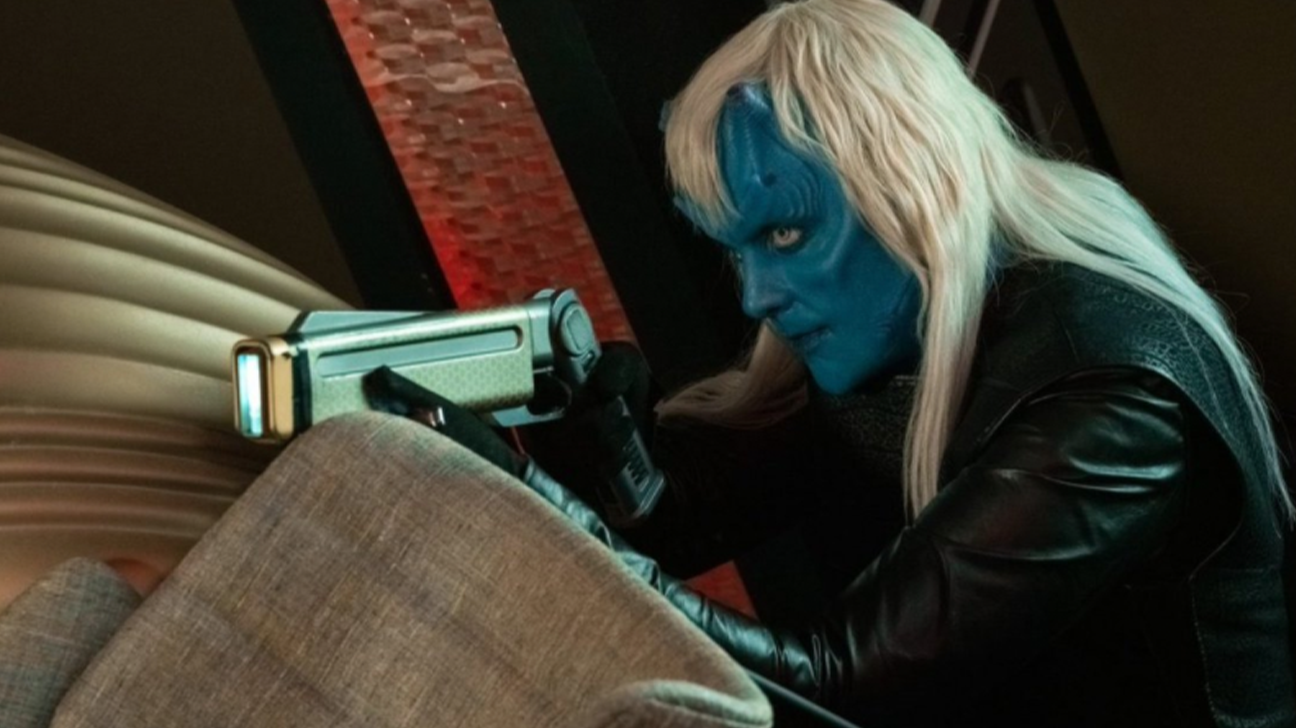
Any wardrobe issues?
One thing that was interesting is that the actor Doug Jones who plays the character Saru must wear prosthetic gloves. Those are very challenging to take on and off, and I was worried that because I didn't have a CGM and needed to do fingerpricks. But my wife Mary told me to let the producers know because not having to wear prosthetic gloves would make a huge difference in managing my blood sugar. They were super accommodating, and that's why in all the scenes that Ryn is in, you can see he's wearing these black gloves that match his costume. Instead of making me wear huge prosthetics or painting my hands blue, and having to ruin the makeup as I touch my diabetes kit. It really made a huge difference.
You mentioned starting on a CGM after filming this role?
Yes, I'm on the Dexcom G6 now. I hadn't been a huge fan of the CGM with the G5, because it was during my third year at Juilliard and I didn't have the energy or patience to deal with it. Not until early lockdown in April 2020, when I was sitting around not doing anything like I had been. So it was easier to adopt and integrate something new into my diabetes management. It was a good move, and I do think looking back that having the CGM would've been useful when filming those scenes during Discovery's third season.
I knew, no matter what Ryn's fate might be, that this was going to be a temporary experience and one that I wouldn't have to make a permanent part of my diabetes management. I think I would have to find a different approach if this were a long-term role, and find new ways of making it work for me day-to-day. CGM is definitely something that I'll have going forward, in any future project that I may do.
Overall, CGM has made a big difference — especially being married and sharing a house. One of my big symptoms when going high is mood swings, and I can sort of get lost in them. So having my numbers available and on Mary's phone makes a big difference and she knows when to let me ride those highs out in the basement.
Did you and Mary work together on the show at all?
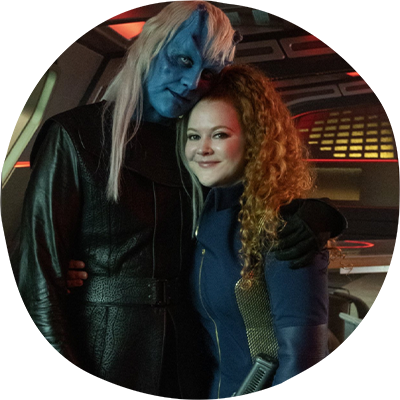
We did a couple scenes together, and that was just amazing. I'd been around the set for almost 2 1/2 years at that point, so I knew the crew and the actors and it was just this electric feeling. Everyone knew I'm this massive Trekkie and how much this meant to me, and everyone was treating me like I'd been the kid on the bench the entire basketball game and finally got to go into the game. To do all of this, and be able to share that experience with Mary, was just so much fun.
Anyone else in the Star Trek universe you've met with T1D, too?
The boom operator or sound guy on Discovery has a son with type 1, and as a dad he's been figuring that out and we were able to connect there. It's always nice to have that, when they give a sort of nod in understanding what it's like. Someone who knows how difficult it is to manage your makeup and costume, the mask and the hair, your lines and the director and writer... and your diabetes on top of it.
Without any spoilers as to Ryn's fate, what's next professionally for you?
Right now, we're not in New York City but up in Toronto as Mary shoots season 4. I am taking it easy and enjoying my time on "Star Trek: Discovery" as long as I have before the sun sets on that, and basically trying to stay safe until the industry at large opens up again.

Comments